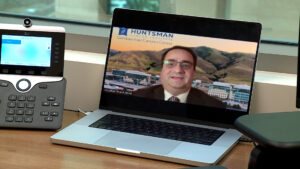AI Revolution: The past, present, and future of artificial intelligence in Utah
May 22, 2023, 10:26 PM | Updated: May 23, 2023, 5:34 am
SALT LAKE CITY — Two simple letters: AI.
When you plug them into any search engine, the information is all over the board, with articles, blog posts, podcasts and social media posts touting cutting-edge advancements in artificial intelligence alongside dire warnings about misuse.
While it’s nearly impossible to ignore the hubbub surrounding AI, there are still lots of questions: What is it? What does it do? How will it impact my life?
While it’s a little tricky to simplify, one thing is certain: it will and likely already has impacted your life.
“It affects every industry, every job,” said Jepson Taylor, AI strategist for Data IQ based in Park City.
Taylor has worked in the AI industry for the past two decades and recognizes the significance of human expertise and experience, making it clear AI does not operate independently but learns from the collective experience of human input.
“(AI) didn’t do it by itself,” Taylor explained. “It did it by consuming all of our experience. You are ultimately the composer. You are the expert. AI is just the enabler. It’s a catalyst. It’s an accelerant for you to move faster.”
How you’re already using AI
Speaking of faster, there are several ways artificial intelligence already affects day-to-day life.
Analyzing traffic patterns to estimate how long it will take you to navigate from point A to point B? You’re using AI.
Auto-completion for text messages and emails: that’s also AI.
Unlocking a phone with your face.
Pop-up ads targeted to your favorite brands.
Auto-pilot in cars.
Voice recognition.
Fraud detection on your credit card.
You got it – all can be attributed to AI.
This isn't the real @MikeHeadrickTV. With advances in artificial intelligence, it can be tough to tell. Watch The past, present, and future of the AI Revolution tonight on KSL 5 News at 10. #ksltv #utah #artificialintelligence pic.twitter.com/3JK41hradx
— KSL 5 TV (@KSL5TV) May 22, 2023
It’s transforming industries, enhancing productivity, and driving innovation, like the medical field.
Physicians like Dr. Jonathan Tward, an oncologist at Huntsman Cancer Institute, are excited about what AI can do in diagnosing and treating cancer.
“There’s now an AI test that can not only, with extreme precision, give me a great idea as to the chance that the cancer will spread after treatment, but it literally lets me know if a drug that is normally routinely used in many people will simply work or not,” Tward said. “What we’re talking about is personalized medicine.”
Personalized medicine, by analyzing vast amounts of medical data and giving results and treatments almost instantaneously will free up medical professionals for other tasks.
AI is a game changer also being used in, well, games.
Four days a week, the Salt Lake Bees Minor League Baseball team is officially using AI to call balls and strikes.
“Pitchers like it, hitters like it,” enthused Bees president and general manager Marc Amicone.
Above the field sits more than a dozen cameras, trained on home plate, with the sole purpose of finding that sometimes questionable strike zone.
“We have people monitoring every pitch, so they immediately know before the umpire knows,” said Amicone. “It goes up and shows a ball or a strike.”
A little black box on the umpire’s belt, connected to an earpiece, immediately communicates the call.
The technology test here in Salt Lake City will have bigger ramifications for Major League Baseball, with the league telling KSL, “There are several important questions about how best to deploy this powerful technology that remain unanswered at this point. We hope to use this season’s test at Triple-A to make progress on those questions in a highly competitive environment.”
Locally, it means fewer arguments with officials.
“If we have the ability to get it right, we should try to get it right,” Amicone said.
The unwritten future of AI
But whenever something is created for right, it can also create a bunch of wrong.
AI has already been used for more nefarious purposes, said BYU adjunct professor of philosophy Darin Gates.
“The concerns center on things like deception, fabrication, plagiarism, as well as things that get into the deep fakes and more criminal aspects,” Gates said.
Biased algorithms leading to workplace discrimination in hiring practices, breaches in data privacy, and cybersecurity are just some of the ways AI is seen in a darker sense.
It’s also being used to create videos and audio recordings meant to mimic real people.
“I think this audio deep fake technology is particularly concerning because they can take a sample of your voice, right? And they can generate, you know, what sounds just like you,” Gates said.
While the future of AI is still to be written, one worry about jobs being replaced with robots may be more myth than reality.
Linda Klug-Airin is the founder and CEO of an AI business based in Park City. She understands how artificial intelligence can replace jobs heavy in writing, research, finance, and graphic design.
While some jobs may disappear, she said it’s more about how AI can free up workers from menial tasks to delve into more interesting ones.
“You might hear of AI mimicking a human brain,” Klug-Airin said, “really it’s just mimicking how we put patterns together.”
It’s the mimicking patterns part she said can improve employee skillsets.
In one case, she saw a customer service agent with a learning disability using AI to do a more complicated and higher-paying job.
“They decided to try using our technology with him, and within two days he was able to do the job,” she said. “Made him happy, made the employer happy.”
The reality is this technology will continue transforming the world as we know it.
Even transforming journalism. Along with the hours of interviews and research KSL did for this story, parts of it were done in a matter of seconds thanks to AI, including transcribing the interviews, and even using ChatGPT to assist with script writing.
Have you experienced something you think just isn’t right? The KSL Investigators want to help. Submit your tip at investigates@ksl.com or 385-707-6153 so we can get working for you.















